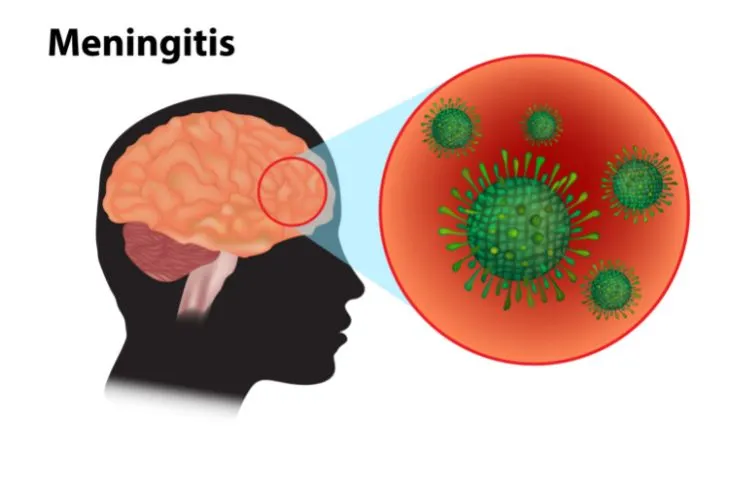- Meningitis is typically triggered by a viral, bacterial, or fungal infection. If it goes untreated, it can become life threatening.
- Some of the most common symptoms are fever, stiff neck, headache, confusion, seizures, fatigue, rash, and light sensitivity.
- The cause of each type of meningitis is slightly different. However, they each enter the body and develop into an advanced infection.
- To prevent meningitis, wash hands regularly, follow safe personal hygiene practices, and steer clear of sick people.
It’s easy to mistake the early signs and symptoms of meningitis with the flu. They both cause the same achy stiffness, a pounding headache, and high fever. However, meningitis is much different than the average case of the flu. This is a condition that causes inflammation of the membranes around the brain and spinal cord, which means it’s much more serious.
Meningitis is typically triggered by a viral, bacterial, or fungal infection. If it goes untreated, it can become life threatening. This is why it’s so important to get informed on the signs and symptoms, as well as the causes, treatment options and some prevention tips. Let’s take a look…
Stiffness
Stiffness of the neck and back occur because meningitis spurs the inflammation of the membranes (or meninges) that encase the brain and spinal cord. It’s this swelling that causes the discomfort and stiffness. Anyone who experiences a sudden fever and headache along with a stiff neck, could have a form of meningitis. Seek treatment and testing to confirm or rule out the cause.
Viral meningitis is often brought on by an enterovirus. Many types of enteroviruses have mild cold and flu-like symptoms, and some of these viruses have been known to cause viral meningitis. If this is the case, it’ll cause a stiff neck. But this form of meningitis isn’t usually as harmful as others. If you have an unexplained stiff neck and some other symptoms, see your doctor. There are several types of meningitis, each ranging in severity (mild to potentially fatal). You can endure severe complications if it goes unchecked and untreated.
Fever
The onset of a sudden and high fever will often occur with meningitis as the infection enters the body and the immune system responds. This is particularly common with bacterial meningitis, which is the most dangerous (requires emergency medical attention). Unfortunately, it’s typically mistaken for other common flu-like illnesses. Symptoms like this typically develop quickly, within 3-7 days after being exposed to the virus.
Unfortunately, the American College of Emergency Physicians explains that while there are three common symptoms of meningitis – fever, headache, and stiff neck, only 44 to 66-percent of patients with the infection will show these three symptoms. In some cases, someone with bacterial meningitis might only have one or two of these symptoms. This can make it difficult to diagnose in emergency medical settings, yet it’s extremely important to identify and treat bacterial meningitis as early as possible to avoid severe, long-term complications and death.
Headache
Another sign of meningitis is a severe headache that won’t go away. Again, this is due to the inflammation and swelling of the membranes that surround the brain and spine. Headaches are considered one of the three most common symptoms of meningitis. Children, youth and adults are likely to get a headache from meningitis, but newborns and children under two don’t typically experience this symptom. Along with a severe headache, you may experience flu-like symptoms.
The type of headache is also important. Not all headaches are the same. If a person has meningitis, the pain of a headache will feel different than other headaches. Dealing with headaches from meningitis is not confined to just one type of the infection. Centers for Disease Control and Prevention (CDC) lists headaches as a symptom of bacterial, viral, fungal, parasitic, and non-infectious meningitis.
Confusion
Meningitis is an infection that can cause the brain to swell, resulting in extreme confusion, lack of focus, memory loss, dizziness, insomnia, lethargy, and difficulty waking up. Sudden confusion, along with other symptoms of meningitis, should be investigated by a doctor. Severe cases of meningitis, especially bacterial meningitis, can worsen quickly and cause permanent damage.
Confusion can present itself in many different ways. You could have difficulty discerning between what’s real versus what’s a dream. Your memories might not be clear or in severe cases, might not even remember major milestones, such as having children or getting married. For some people, this confusion can last quite some time and be very hard to deal with. It can lead to frustration and embarrassment. It can affect daily life until the symptoms go away. A strong and patient support system can help relieve the emotional toll.
Light Sensitivity
Meningitis can cause extreme light sensitivity (photophobia). This will lead to squinting, eye pain, difficulty with vision in sunlight or under bright lights, and migraine-like headaches. Many symptoms, including light sensitivity, can develop quickly. They usually start within a couple hours of exposure to the virus (bacteria or fungi). Sometimes they develop a day or two later. Light sensitivity is a common early sign. If it comes on suddenly, look for other signs and symptoms. See a doctor before it worsens.
Your vision could become blurry from meningitis, because the optic nerve can swell. In most cases, the swelling will eventually go down and your vision will return with no lasting damage. However, in some severe cases of meningitis, partial or full blindness can occur in one or both eyes. If this happens there is no chance of reversing the effect. Sometimes the optic nerve is damaged beyond repair. Yet another reason why it’s important to get a diagnosis and treatment plan as soon as possible.
Nausea
Nausea and/or vomiting often occurs with meningitis in the early development stage. As the infection progresses, severe stomach upset, nausea, and vomiting will cause patients to lose their appetite and weight. Depending on the severity of the infection, extreme weight loss can occur from loss of appetite, vomiting, and nausea, causing other health issues. Your body won’t get the vitamins, minerals, and nutrients it needs when rapid weight loss occurs from not eating or being able to keep things down. Your immune system will also suffer.
Those who have weakened immune systems prior to meningitis are more susceptible to catching the infection, and the complications and symptoms can be much worse because their immune system isn’t strong enough to fight and heal. Overall, as unpleasant as nausea and vomiting are, the potential short and long-term health ramifications can be much worse. Getting the necessary treatment and trying to eat even when not hungry is vital to the healing process.
Rash
Oftentimes meningococcal meningitis infection will cause skin rashes. This is particularly true in babies and toddlers who may also develop a bulge in the soft spot on the top of their heads. Rashes appear from the bacteria multiplying in the bloodstream, releasing poisons that begin to damage blood vessels, resulting in what looks like several little rashes on the body.
The Glass Test (or Tumbler Test) is an easy at-home method for checking if the rash is caused by meningitis. In this test, a clear drinking glass is pressed firmly against one or several of the rashes, paying attention to the rash marks. If the marks stay the same (i.e., you can see them clearly through the glass), you seek medical attention immediately. If the skin was just irritated and a rash developed, it would fade with the pressure of the glass.
This test can also be used to test for septicemia (blood poisoning). It’s not uncommon for people to develop septicemia when they have meningitis, because the germs and bacteria that cause meningitis are the same ones that cause septicemia.
Irritability
The fever, discomfort, and stiffness associated with meningitis will make normal daily activities and even sleeping uncomfortable. Patients of all ages, especially small children, may be difficult to comfort and extremely irritable. It’s difficult to cope with even the mildest of symptoms, and it can eventually take a toll on the patient’s emotional and mental health. While a lot of meningitis cases are resolved within 1 or 2 weeks, severe cases can go on for months. The symptoms can prevent the patient from doing much other than bed rest. And in extreme cases of meningitis, hospitalization for weeks and months at a time can occur.
Irritability can also come from confusion, another symptom of meningitis. Being unable to discern between reality and dreams, losing memories, and difficulty thinking clearly only add to the patient’s burden. In children, confusion is even more likely to lead to increased irritability, because it’s difficult for them to fully comprehend the illness.
Loss of Appetite
The nausea and stomach upset from meningitis can be mistaken for a flu that affects the digestive tract and causes loss of appetite. Unfortunately, meningitis is not often caught early because some symptoms are so similar to the flu. But loss of appetite can lead to unsafe and unhealthy weight loss, as well as the lack of vital nutrients the body needs to be healthy.
It’s important to regularly attempt to eat when you have meningitis. Food provides sustenance and can help strengthen your immune system. It can be especially difficult to get children to eat and infants to feed. Severe cases of meningitis may result in hospitalization not only because of the infection but the effect it has on the rest of your body. Intravenous fluids administered at a hospital help patients stay hydrated, and medical staff are nearby to keep a close watch on symptoms that can lead to additional health problems.
Seizures
In extreme cases, meningitis can cause seizures with a very high fever. This can happen if bacterial toxins enter the fluid surrounding the brain and spinal cord which then causes pressure on the brain. Bacterial meningitis is more likely to cause seizures than viral meningitis, and it’s possible to experience seizures in just one area of the body. Some seizures can lead to disability or death, but there are treatments and environmental changes that can help prevent seizures from occurring.
Since meningitis can cause sodium levels to drop (sometimes triggering seizures), intravenous fluids to maintain a healthy level of sodium in the body can help. Anticonvulsant medications and resting in a quiet room can also help prevent or lower the severity of the seizure.
The number of bacterial meningitis cases, the worst type of meningitis, is much lower in North America. While permanent after effects of meningitis are uncommon, there is a possibility for permanent and temporary health problems, including epilepsy and seizures. These fits can come and go at random times and significantly disrupt a person’s life.
Fatigue
This kind of fatigue will be so severe it will be difficult to wake the person from their slumber. They’ll constantly feel drowsy throughout the day, no matter how much sleep they get at night. This can have a domino affect on other aspects of their life, affecting their job, social life, and ability to complete everyday tasks. According to Healthline, this symptom is present in bacterial meningitis and viral meningitis but not in fungal meningitis.
In addition to being drowsy, a person who is suffering from meningitis might also act sluggish or lethargic. Unfortunately, this symptom could indicate a slew of health conditions. The best way to determine whether it is due to meningitis is to match it with other symptoms on this list. Also, be in tune with your body. You are the best person to know what feels normal and what doesn’t.
Cold Hands and Feet
Usually when a person is more prone to having cold hands or feet, we assume it’s something to do with their circulatory system. But if it occurs in tandem with several of the other symptoms on this list, it could be due to meningitis.
Medical News Daily explains that this is one of the early symptoms of meningitis, and cold hands and feet will often accompany signs of a high fever.
More Serious Warning Signs
While meningitis is serious enough on its own, it becomes quite serious when it enters into the bloodstream. This can happen with bacterial meningitis, the most serious form of meningitis. If bacterial meningitis goes untreated, it can get into the bloodstream cause “paralysis, stroke, seizures, sepsis, and even death,” writes Healthline.
If bacterial meningitis enters into the blood stream, WebMD says it will cause symptoms like “abnormal skin color, stomach cramps, ice-cold hands and feet, skin rash, muscle aches or joint pain, rapid breathing, and/or chills.”
Newborn Signs
The only thing more scary than having meningitis is thinking your child is suffering from this condition, especially an infant. According to Very Well Health, newborns and infants won’t necessarily have the same signs as an adult, and obviously, in most cases, they’re unable to communicate what’s wrong. Thankfully, there are other ways to tell if your child is suffering from meningitis. According to Very Well Health, an infant “may experience fussiness, excessive tiredness, diminished eating and drinking, and vomiting. The soft spot on their skull (fotanel) may also bulge.”
While babies have separate symptoms from adults, they will showcase some similar ones. For example, NHS expands on this by stating that newborns can be irritable, unable to or not want to feed, sleepy, hard to wake up, unable to console, fever, jaundice, have an unusual high-pitched cry, and some stiffness in their body and neck.
Cause of Meningitis
Each type of meningitis has a different cause. However, ultimately they all act in the same way. “A bacterium, fungus, virus, or parasite spreads through the body (via the bloodstream, nerve endings, or even a dormant reactivation in the nervous system) until it reaches the brain, or spinal cord,” writes Healthline.
Once the bacteria or virus enters the body, it settles into the lining or fluids around the vital body parts. From here it will start to develop into a more advanced infection. If a person has non-infectious meningitis, then it’s likely caused by a physical injury or other condition, explains the source. In this case it doesn’t involve any kind of infection.
Preventing Meningitis
Meningitis often develops from bacteria or viruses that spread between people through coughing, sneezing, kissing, or sharing personal items. You can easily avoid meningitis by practicing safe or good personal hygiene.
The Mayo Clinic advises washing hands regularly to prevent the spread of germs. Teach children to wash their hands often, especially after using the toilet or spending time in a crowded place. Practice good hygiene by not sharing drinks, food, straws, etc. Maintain a strong immune system by keeping up good health. This means getting a good nights sleep, eating healthy (lots of fruits, vegetables, and whole grains), and exercising regularly.
If you are the person who is sick, please cover your mouth and nose when sneezing. Wash your hands regularly. Lastly, pregnant women should be careful with food. Make sure meat is thoroughly cooked and avoid cheeses made with unpasteurized milk.
Treatment Options for Meningitis
The treatment for meningitis depends on the type of meningitis a person has. Bacterial meningitis needs immediate treatment with antibiotics and sometimes corticosteroids, says the Mayo Clinic. An antibiotic not only help aid recovery, but it can help prevent complications like seizure or brain swelling.
Viral meningitis cannot be cured with antiobitcs. In most cases, patients have to heal on their own and can do so in several weeks. For mild cases a doctor will recommend bed rest, plenty of fluids, and possibly over-the-counter pain medications to help with fever and body aches, says the source. If meningitis is a result of a herpes virus, antiviral medication is available.
If cause of meningitis is unknown a doctor may prescribe antiviral or antibiotic treatment until a determination is made, notes the source. Treatment for chronic meningitis depends on the cause. For example, if its fungal, there are anti fungal medications or a combination of specific antibiotics that can treat tuberculous meningitis. These medications can have serious side effects so they should only be used if it’s certain to be fungal meningitis.
Parasitic meningitis may involve treating only the symptoms or the infection directly, explains Healthline. “Depending on the cause, this type may get better without antibiotic treatment. If it worsens, however, your doctor may try to treat the infection itself,” writes the same source.




















